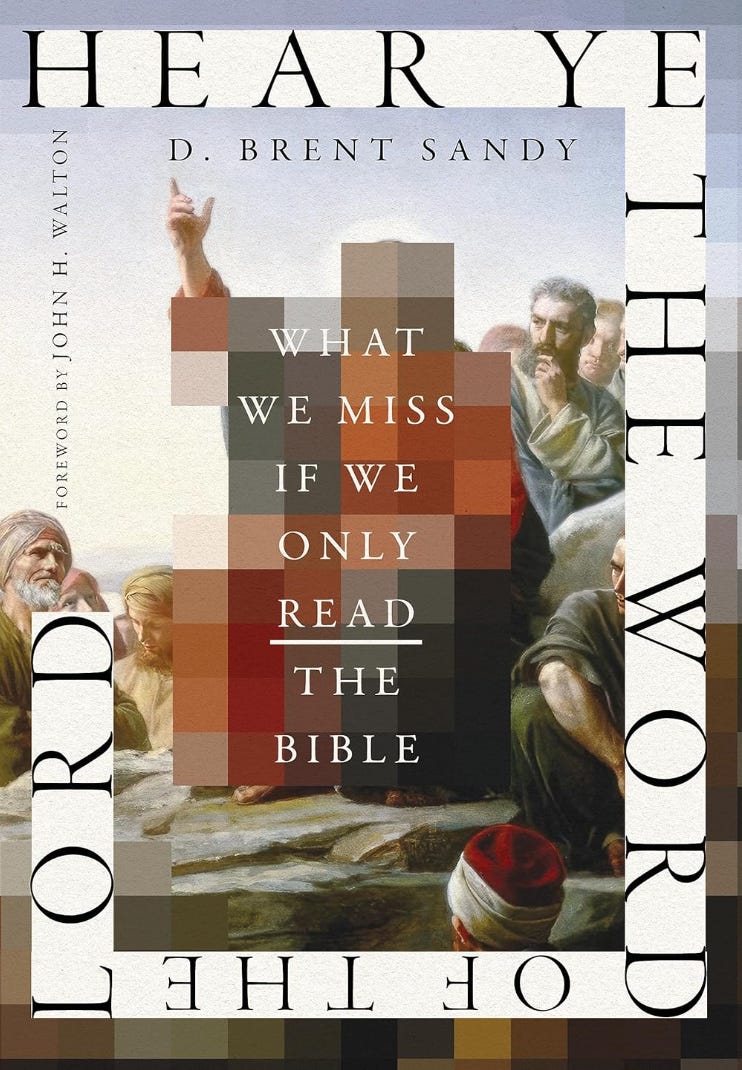What Difference Does It Make?
My Inbox informs me of books that are groundbreaking. It is not an overstatement to say I get such announcements daily. A cautious expression would make it five times a week. Reading such a book can lead one to ask What difference will it make? They can’t all be groundbreaking. Publishers and authors have an obligation, just to get something published, to ask and articulate the significance of a given proposal or book. Some authors have enough street cred that publishers accept their proposals regardless of significance, in part because the publisher knows the book will sell. Names and books can go unmentioned here.
Some books make a difference.
Which brings me to the new book, Hear Ye the Word of the Lord, by D. Brent Sandy. We needed a book that took us from the oral performance literature, which helps immensely when reading the Bible or offering nuances and finesses, to how orality helps us when operating in textuality with a written text. After all, even though the various books of the Bible entered into the book world out of an orality world, the Bible is a written text. So, Sandy explores how knowing the orality world helps us in reading the Bible. He helps ordinary Bible readers to think about the texts of the Bible in new ways, and in this sense his book makes a difference.
I want to quote an important summary paragraph from his fourth proposition. Many don’t know how un-literate ancient cultures were, and the same may well need to learn that our assumptions are not theirs.
Levels of literacy depended on several issues: social and economic status, the necessity of literacy for business purposes or government bureaucracy, and where people lived – with rural being the lowest level of literacy – encompassing as much as 85 percent of the population. The majority of people (maybe as much [as] 90%) would not have been skilled enough to fluently read one of the Gospels or Paul's letters. Most heard; they didn't read. Fewer still would have been able to compose a literary document themselves.
Nor was writing conducive to our expectations for a text to be read aloud. All caps, no spaces between words, no punctuation. Lectors, or those reading texts aloud, may well have used the text as something to look at to refresh what one had to say but not necessarily to read word by word. Since texts were read in a performative way one “reading” would be different than another “reading.” Lectors interacted with the listeners in the “reading/performing” of the text.
Back now to the value of knowing this stuff: Sandy makes four observations that derive from research into oral and book cultures.
First, an orality culture is “high context.” That is, the surrounding context shapes the reading and the meaning. When Jesus said “and does not hate father, mother…” he surely cannot be understood apart from his context, which we have to work at to discern. Jesus gave that statement in a context. Orality cultures and reading a text in that oral context will provide that context more dynamically. High context assumes, too, that a reader/text will share the same context as the listening audience. Good readers exercise healthy imaginations.
Second, written words originally given orally “shifts communication between speaker and hearer into fractions of meaning that become fixed on pages (letters, words), which can only partly convey the fullness of the original communicative act.” The fullness of context is reduced. So he speaks of the need to “resuscitated.”
Third, in oral cultures “meaning … is constantly being negotiated between sender and recipient(s) as the speaker considers the best way to communicate the intended message in relation to the audience’s situation and ongoing reception.” Hearers thus need to engage to catch the meanings. We can imagine our ways back into those reading rooms, seeing ourselves both as reader and listener. It can help. We need to ponder, to take an example of my own making, how the Corinthians would have responded when Paul got irritated in 2 Corinthians 10-13. One has to think they were miffed at times.
Finally, “verbalizing a communication in oral culture is generally an act of performance.” The original reading/performance of the text was lively, not presumptive. Listen to how many read Scripture in our churches today. It can be, and is at times, lifeless. If we think of it as performing the text – thank you Professor Osbeck from my college class on Oral Interpretation, our reading will be much different. 1st Century readings were more like oral interpretation. We need to “re-oralize” the text.
He's suggesting these four what-difference-does-it-make? points for learning about orality for our own reading of the Bible.




I’m thinking of Phoebe here and wishing I could go back in time and hear her read Romans!
Scot, thanks for continuing to discuss this book. I read (listened) to "Hear Ye" since your first post, which seemed like an appropriate way to initially digest such a book. :- ] I had to go to the text version, however, to find the names of the scholars whose work I expected to be cited (Ong, Kelber, Rodriguez). This is not a fault with the book or the author, but with my expectation; Dr. Sandy has written in a conversational tone and, while scholarly, for a more popular audience, and, frankly, for a listening audience. Well done, sir.
As I continue to share Romans through live, interactive performances, one of my hopes is to highlight the orality within Paul's letters, which is often missed as people focus on orality in the Gospels. I am addressing this aspect of Romans in my master's thesis, along with a number of other exegetical insights gleaned from the performance process.